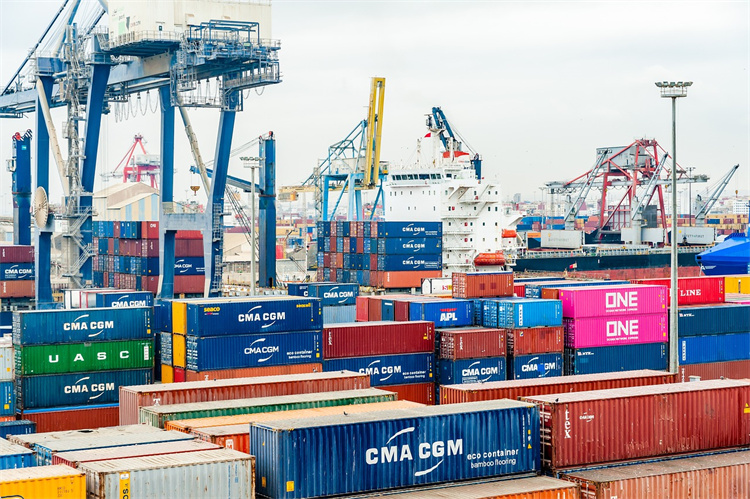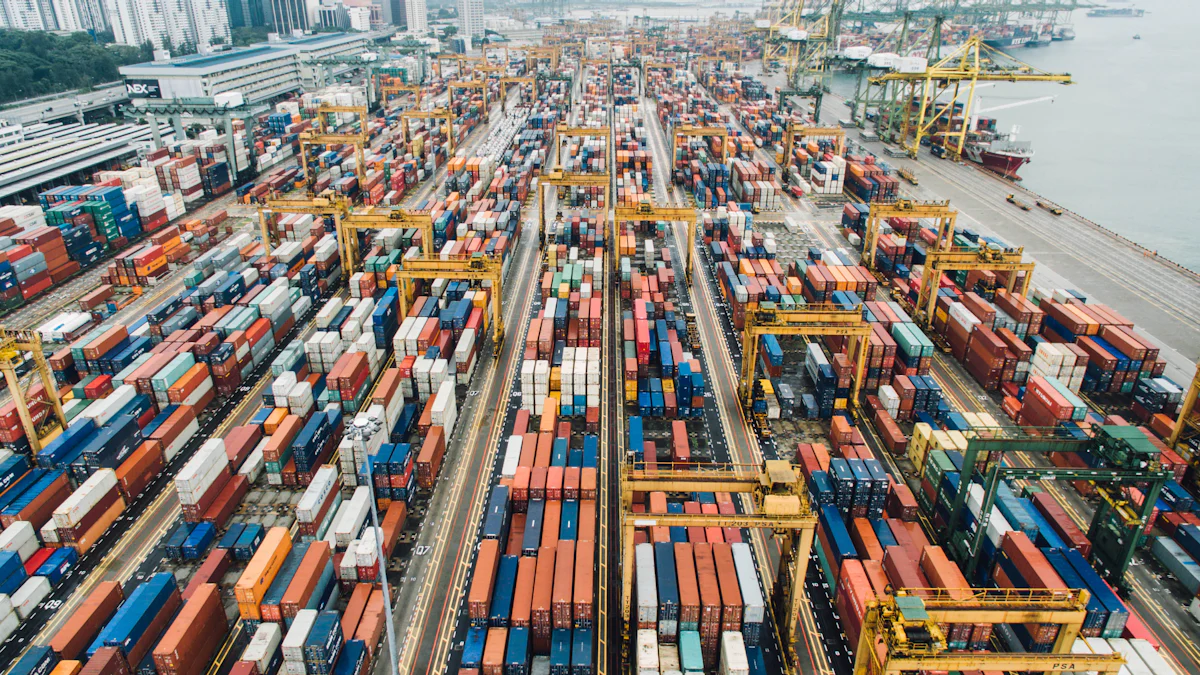A Comprehensive Guide to Multimodal Transport Logistics

Multimodal Transport Logistics involves using multiple modes of transportation under a single contract to move goods efficiently. This approach plays a crucial role in the global supply chain by optimizing the movement of goods across various transport modes like road, rail, sea, and air. The process requires meticulous planning and coordination among different stakeholders to ensure seamless operations.
Understanding Multimodal Transport Logistics
Definition and Key Concepts
What is Multimodal Transport?
Multimodal Transport Logistics involves the use of at least two different modes of transport under a single contract. This method optimizes the movement of goods by integrating various transport modes such as road, rail, sea, and air. The goal is to ensure efficient and seamless transportation from the origin to the final destination.
Key Components and Stakeholders
Multimodal Transport Logistics comprises several key components and stakeholders. The main components include transportation modes, infrastructure, and technology systems. Stakeholders involve shippers, carriers, freight forwarders, and regulatory bodies. Each stakeholder plays a crucial role in ensuring the smooth operation of the logistics process.
Historical Evolution
Early Forms of Multimodal Transport
Early forms of Multimodal Transport Logistics date back to ancient trade routes. Merchants used combinations of land and sea routes to move goods. The Silk Road is a prime example, where traders combined caravans and maritime routes to facilitate trade between Asia and Europe.
Modern Developments and Innovations
Modern developments in Multimodal Transport Logistics have introduced significant innovations. Advances in technology have enabled real-time tracking and monitoring of shipments. Integration of Transportation Management Systems (TMS) has streamlined operations. Companies like JUSDA have set benchmarks by offering comprehensive multimodal services. JUSDA's extensive network covers road, ocean, air, and rail freight, ensuring efficient supply chain solutions.
Benefits of Multimodal Transport Logistics
Efficiency and Cost-Effectiveness
Reduced Transportation Costs
Multimodal Transport Logistics significantly reduces transportation costs. Combining various modes of transport allows for the optimization of routes and resources. For instance, using rail for long hauls and trucks for short distances minimizes fuel consumption and labor costs. This strategic approach ensures cost savings for shippers.
Improved Delivery Times
Multimodal Transport Logistics enhances delivery times by leveraging the strengths of different transportation modes. Air freight offers speed for urgent shipments, while sea freight provides cost-effective solutions for bulk goods. Integrating these modes ensures timely deliveries, meeting customer expectations and improving overall service quality.
Environmental Impact
Lower Carbon Footprint
Multimodal Transport Logistics contributes to a lower carbon footprint. Utilizing rail and sea transport, which are more environmentally friendly than road and air, reduces greenhouse gas emissions. This approach aligns with global sustainability goals and helps companies meet regulatory requirements.
Sustainable Practices
Multimodal Transport Logistics promotes sustainable practices. Companies like JUSDA implement eco-friendly strategies across their operations. JUSDA's extensive network covers road, ocean, air, and rail freight, ensuring efficient and reliable supply chain solutions. By optimizing consolidation and managing fleet capacity, JUSDA reduces operating costs while enhancing service quality and efficiency. These practices support long-term environmental sustainability.
Challenges in Multimodal Transport Logistics
Coordination and Communication
Managing Multiple Stakeholders
Multimodal Transport Logistics involves various stakeholders. Shippers, carriers, freight forwarders, and regulatory bodies must work together. Effective coordination ensures smooth operations. Miscommunication can lead to delays and increased costs. Each stakeholder must understand their role and responsibilities. Clear communication channels are essential for success.
Technology Integration
Technology plays a crucial role in Multimodal Transport Logistics. Integrating different systems can be challenging. Transportation Management Systems (TMS) help streamline operations. Real-time tracking and monitoring enhance visibility. However, technology adoption requires investment and training. Companies must stay updated with technological advancements.
Regulatory and Compliance Issues
International Regulations
Multimodal Transport Logistics must comply with international regulations. Different countries have varying rules and standards. Compliance ensures smooth cross-border operations. Non-compliance can result in fines and shipment delays. Companies must stay informed about regulatory changes. Proper documentation is essential for compliance.
Customs and Documentation
Customs procedures can complicate Multimodal Transport Logistics. Accurate documentation is crucial for smooth customs clearance. Incorrect or incomplete paperwork can cause delays. Companies must understand the requirements of each country. Efficient documentation processes reduce the risk of errors. Training staff on customs procedures is vital.
Practical Applications and Case Studies

Industry-Specific Examples
Automotive Industry
The automotive industry relies heavily on multimodal transport logistics. Manufacturers use a combination of road, rail, and sea transport to move parts and finished vehicles. Road transport handles short distances from factories to rail terminals. Rail transport covers long distances efficiently. Sea transport facilitates international shipping. This approach ensures timely delivery and cost savings.
Retail and E-commerce
Retail and e-commerce sectors benefit significantly from multimodal transport logistics. Companies use air freight for fast-moving consumer goods. Sea freight handles bulk shipments. Road transport manages last-mile delivery. This integration ensures quick and efficient delivery to customers. Retailers can maintain lower inventory levels and reduce storage costs.
Successful Case Studies
Case Study--JUSDA
JUSDA's multimodal transport logistics offer comprehensive services across various transportation modes. The company ensures efficient and reliable supply chain solutions.
Road Freight: JUSDA operates an extensive road transportation network. Major routes cover South China, East China, and the route from Wuhan to Beijing. The network provides over 800 trunk line services, reaching every county-level city nationwide (excluding Xinjiang and Tibet). Services operate 24/7. Cross-border road freight services connect China with ASEAN countries like Vietnam and Myanmar. Tailored transport solutions serve industries such as new energy vehicles and electronics. By optimizing consolidation and managing fleet capacity, JUSDA reduces operating costs and enhances service quality.
Ocean Freight: JUSDA's ocean freight services reach over 500 destinations worldwide. The company manages more than 2,500 international maritime routes with an annual throughput exceeding 300,000 TEUs. Services include FCL (full container load), LCL (less than container load), dedicated warehouse operations, and distribution. Value-added services feature temperature-controlled and special container transportation.
Air Freight: JUSDA's air freight services include a mature route network. Established routes cover China-Mexico-US and Vietnam-US. New routes, such as China-India, are in development. A three-stage consolidation service optimizes airfreight costs. BSA (Block Space Agreements) and external resources adapt to seasonal fluctuations. JUSDA combines its own capacity with partner resources to ensure fast and secure global air freight services.
Rail Freight: JUSDA specializes in full-container and less-than-container-load services via China-Europe block trains. The company offers international Eurasian sea-rail intermodal transport and domestic multimodal transport. Real-time monitoring and tracking of temperature and humidity ensure high-quality services. Strategic partnerships and over ten years of experience in rail freight operation enable JUSDA to serve over 30 countries across the Eurasian continent.
Integrated Logistics: JUSDA provides customized storage and distribution solutions. The company excels in home appliance assembly and delivery. A self-developed e-commerce storage and distribution system interconnects with import/export agency networks at major ports nationwide. The system processes a vast number of orders daily and achieves EDI system integration with mainstream domestic and international e-commerce platforms.
Cloud Warehouse: JUSDA's cloud warehouse service supports multi-channel sales from businesses to consumers. Automated warehousing and intelligent transfer systems enhance efficiency. The service ensures seamless operations and customer satisfaction.
Solutions to Common Challenges
Technological Solutions
Transportation Management Systems (TMS)
Transportation Management Systems (TMS) play a critical role in Multimodal Transport Logistics. These systems help manage and optimize the transportation process. TMS provides route planning, load optimization, and carrier selection. Companies can reduce costs and improve efficiency by using TMS. Real-time data from TMS enhances decision-making capabilities.
Real-Time Tracking and Monitoring
Real-time tracking and monitoring are essential for Multimodal Transport Logistics. These technologies provide visibility into the movement of goods. GPS and IoT devices enable real-time updates. Companies can monitor shipments across different transport modes. This visibility helps in proactive issue resolution. Real-time tracking ensures timely deliveries and improves customer satisfaction.
Best Practices
Effective Communication Strategies
Effective communication strategies are vital in Multimodal Transport Logistics. Clear communication channels among stakeholders prevent misunderstandings. Regular updates and meetings ensure everyone is on the same page. Companies should use standardized communication protocols. This approach minimizes errors and delays. Effective communication enhances coordination and efficiency.
Streamlining Documentation Processes
Streamlining documentation processes is crucial in Multimodal Transport Logistics. Accurate and complete documentation ensures smooth customs clearance. Digital documentation reduces the risk of errors. Automated systems can handle repetitive tasks. Proper training for staff on documentation requirements is essential. Streamlined processes save time and reduce operational costs.
Multimodal transport logistics play a vital role in optimizing global supply chains. This approach enhances efficiency, reduces costs, and promotes sustainability. Adopting multimodal strategies can significantly improve operational performance and environmental impact. For those seeking to enhance their logistics operations, consulting with experts or exploring further reading on multimodal transport logistics is highly recommended.
See Also
Sustainability Solutions for Efficient Supply Chain Transport
Unveiling Top Global Logistics Firms Guide
Discovering Cutting-Edge Transport Tech for Supply Chains
Affordable Transportation Management: Budget-Friendly Solutions
Future Forward: Exploring Breakthroughs in Logistics Technology
